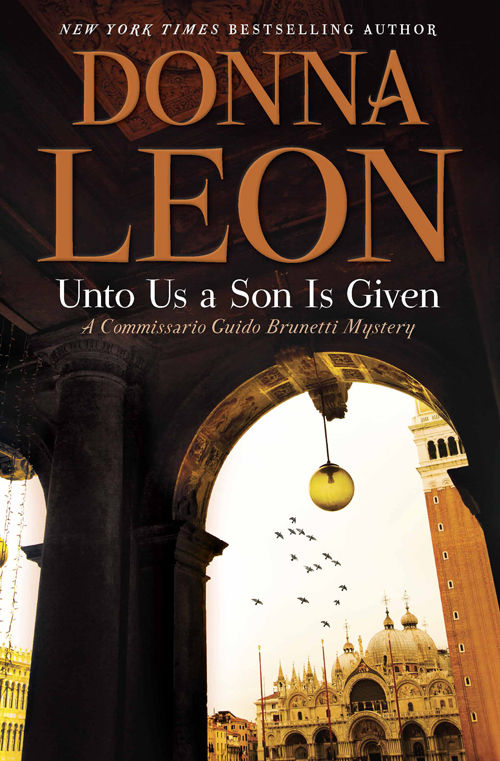
Unto Us a Son Is Given
A Commissario Guido Brunetti Mystery, Book 28
کتاب های مرتبط
- اطلاعات
- نقد و بررسی
- دیدگاه کاربران
نقد و بررسی

November 1, 2018
The elderly Gonzalo Rodríguez de Tejada wants to adopt a young man as his son (and heir), and de Tejada's best friend, Count Orazio Falier, wants his son-in-law, Commissario Guido Brunetti, to intervene. Brunetti sees no reason for alarm, but then de Tejada unexpectedly drops dead in the street and a friend attending the memorial service is strangled. More mystery from one of the 50 Greatest Crime Writers ever according to both Time and the Times of London.
Copyright 2018 Library Journal, LLC Used with permission.

February 15, 2019
What does a father owe his son--and what do sons owe their fathers? Venice's most thoughtful detective, Commissario Guido Brunetti, has occasion to ponder these questions in several forms during his latest outing.Surprisingly, Brunetti's own son, Raffi, doesn't play a large role, though we're treated to the usual Brunetti family conversations over delicious home-cooked lunches. The story begins with Brunetti's father-in-law, Conte Falier, asking him to look into something: There's gossip going around that the Conte's best friend, retired art dealer Gonzalo Rodríguez de Tejada, is planning to adopt his lover, Attilio Circetti, a much younger man, since that would be the only way Italy's inheritance laws would allow him to pass his entire estate to Attilio when he dies. The Conte is much too discreet to say it in so many words, but he wants to make sure his friend isn't being scammed. Brunetti doesn't want to get involved, but he finds himself moved when his father-in-law regretfully says, "I've just asked someone I love to spy on someone else I love." You can almost hear the song "Do You Love Me?" from Fiddler on the Roof playing in the background as Brunetti ponders the sentiment he's never heard from the Conte before. How can he say no after that? A few days later, another request: Brunetti's boss, Vice-Questore Patta, has a story about how his wife was insulted by an 8-year-old boy who lives in their building. He wants Brunetti to find out if there's "something wrong with the boy," and if not, to look into the parents' backgrounds. If the boy does have "real problems," he says, he doesn't "want to cause them more trouble." Could Patta be more sensitive than he always seemed? Eventually, of course, there are deaths--one natural, one not--but as usual the mystery takes a back seat to Leon's (The Temptation of Forgiveness, 2018, etc.) beautiful writing and the pleasure of spending time with Brunetti and company.Leon says Venetians are "accustomed to swimming in the swirling froth of information and misinformation that flowed through so much of daily life," and readers can trust her to guide them safely to dry land.
COPYRIGHT(2019) Kirkus Reviews, ALL RIGHTS RESERVED.

Starred review from December 1, 2018
Once again, Leon transforms what might have been a straightforward mystery into something much richer and more resonant?in this case, a meditation on love, loss, family, and prejudice. When Venice police commissario Guido Brunetti is asked by his father-in-law to investigate the young man whom a close family friend, 85-year-old Gonzalo Rodriguez de Tejada, plans to legally adopt?and thus, according to Italian law, make the sole heir to Gonzalo's considerable wealth?Brunetti is taken aback. What business is it of his?or anyone's?to interfere with Gonzalo's plans? And, yet, there are concerns that Gonzalo, who is gay, is being taken advantage of by the younger man, with whom Gonzalo appears smitten. Would Gonzalo's friends and family make the same assumptions if Gonzalo were heterosexual, Brunetti wonders, prompting him to doubt his own assumed freedom from prejudice. When Gonzalo dies suddenly of a cerebral hemorrhage, and his oldest friend, in Venice to organize a memorial, is murdered shortly thereafter, Brunetti is forced to investigate the crime, knowing that even finding the killer can never lessen the human tragedy that stands behind it. Many crime novels place domestic story lines alongside crime plots, but Leon masterfully blends the two, enhancing our understanding of both. It is in Brunetti's conversations with his wife and children, and in his musings on his reading (in this case, Euripides' The Trojan Women) that we come to feel the full force of how preconceived notions about gender and sexuality can erode even the seemingly strongest of relationships. Far more than whodunit, the real subject of this novel (and Leon's work in general) is what we all do to one another. HIGH-DEMAND BACKSTORY: Like Louise Penny, Leon has cultivated an utterly devoted audience, ever anxious to get to know more about her characters.(Reprinted with permission of Booklist, copyright 2018, American Library Association.)

























دیدگاه کاربران